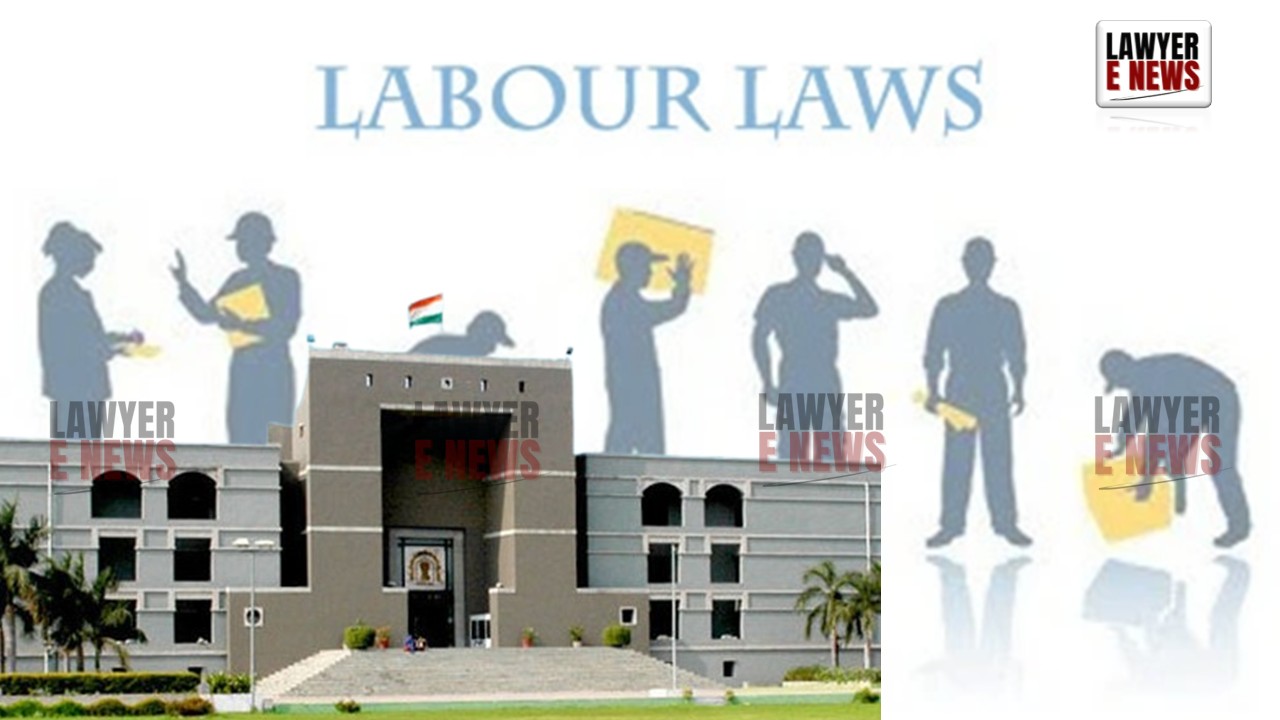-
by Admin
18 February 2026 1:48 AM



Existence of Earlier Settlements Does Not Take Away the Right to Raise Fresh Industrial Disputes - Gujarat High Court delivered a crucial ruling underlining that contractual workers are not precluded from raising industrial disputes simply because prior settlements existed. The Single Bench of Justice M.K. Thakker firmly rejected the company’s challenge to the State Government’s order referring the dispute to the Industrial Tribunal, clarifying that the legality of the contract labour system and wage claims must be decided by the tribunal, not dismissed prematurely under the garb of prior settlements.
“Whether the Contract is Sham and Bogus Cannot be Pre-Determined by the Government or this Court”: Gujarat High Court Reminds Petitioner
The petitioner, Kalptaru Projects International Ltd., a part of the Kalpataru Group, had invoked the writ jurisdiction to quash the reference made under Section 10(1) of the Industrial Disputes Act, 1947. The reference arose from the demands raised by Gujarat Mazdoor Sabha (GMS) alleging that over 700 contract workers were in fact performing perennial and permanent work for the company under a sham contractual arrangement. The workers sought parity with permanent employees concerning wages, allowances, and service conditions.
Kalptaru contended that several settlements under Section 12(3) of the ID Act, including the 2017, 2020, and 2024 agreements, had already been entered into between contractors and other unions, accepting that the workers were employees of the contractors and not of the principal employer. The company argued that these settlements bound the workers and precluded any fresh dispute.
The Court, however, rejected this argument, observing, “Even if some workmen were bound under the compromise arrived, this in no way deters their right to raise the industrial dispute and get the same adjudicated,” placing reliance on the Supreme Court’s authoritative ruling in Tamil Nadu Terminated Full Time Temporary LIC Employees vs. LIC, (2015) 9 SCC 62.
Prior Settlements Do Not Dismiss Existence of Industrial Disputes, Tribunal Must Adjudicate on Facts
The petitioner also urged that the Gujarat Mazdoor Sabha had no locus standi as it was not representing the company's direct employees but rather the employees of the contractors, and that the contractors were independently registered under the Contract Labour (Regulation and Abolition) Act, 1970, with no breach alleged. The company further stressed that the contracts could not be presumed sham merely because the workers raised such an allegation.
Justice Thakker clarified, “Whether employment of contractors is sham, bogus, or a paper arrangement is to be examined by the learned Tribunal and cannot be decided by the Appropriate Government or this Court.” The Court highlighted that such questions involve disputed questions of fact requiring trial, and it would be improper for the Court to short-circuit the statutory scheme by preemptively accepting the petitioner’s version.
The Court noted that mere settlements between the contractors and unions such as Akhil Gujarat Mazdoor Sangh (AGMS) or Gujarat Shramik Seva Sangh (GSSS) in previous years, where workers accepted contractual status, did not extinguish the right of the Gujarat Mazdoor Sabha to espouse the cause of the present set of workers.
“Reference is Not Vitiated Merely Because Similar Demands Were Settled Earlier”: Court Protects Fresh Cause of Action for Workers
Rejecting the argument that the reference is vague or self-contradictory, the Court observed, “Reference cannot be held bad simply because similar disputes were earlier settled or because contractors’ employees seek parity with permanent employees.” Justice Thakker further explained that Section 10 empowers the government to refer matters for adjudication if it finds that an industrial dispute exists or is apprehended, and once such satisfaction is recorded, courts should not interfere lightly.
The judgment found support in Manager, Hotel Imperial vs Chief Commissioner, Delhi [AIR 1959 SC 1214], where the Supreme Court held that non-specification of individual names of affected workers does not vitiate the reference when the dispute is general in nature and concerns a class of workers.
The Court also rejected the plea that the Tribunal’s jurisdiction was improperly expanded by the reference, emphasizing, “The Tribunal is bound to adjudicate strictly within the scope of the issues referred but cannot be denied jurisdiction merely because the dispute has links to earlier settlements.”
“Prima Facie Existence of Dispute is Enough — This Court Cannot Decide Factual Issues in Writ Jurisdiction”
The Court categorically held that the question of whether the alleged contract is genuine or sham and whether contract workers are in fact permanent employees, are disputed facts. The Court observed, “Such disputed questions cannot be decided in exercise of powers under Article 226 of the Constitution.”
The petitioner’s submission that the government mechanically referred the dispute without independent satisfaction was also rejected. Justice Thakker observed that the conciliation officer had submitted a failure report after following due process, and the Appropriate Government thereafter formed its opinion based on materials available.
Summing up, the Court refused to quash the reference and observed, “The challenge to the Reference is rejected. The Industrial Tribunal is directed to proceed with the adjudication in accordance with law.”
By affirming the workers' right to agitate fresh disputes despite prior settlements, this judgment maintains the established legal position that industrial adjudication must not be stifled by technical objections when serious factual controversies exist.
Date of Decision: 26 March 2025
